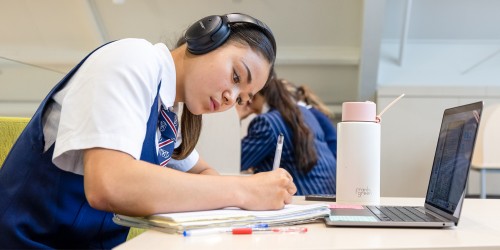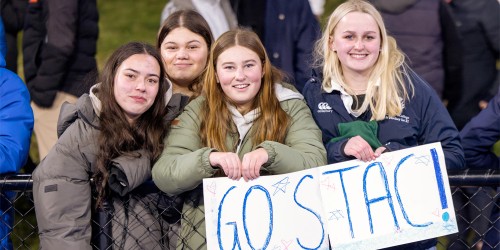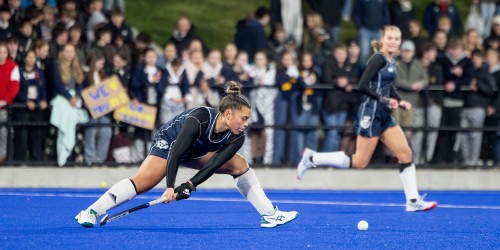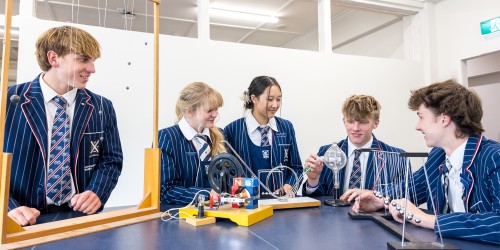
You are logged in as
Logout
You are logged in as
LogoutThis website uses cookies to distinguish you from other users. This helps us to provide you with a good user experience and also allows us to improve our website. More information

 Assessment is an important part of the College academic programme.
Assessment is an important part of the College academic programme.
Students will receive regular reports during the year, as well as fortnightly reports commenting on attitude and effort. Tutors will discuss these with students before they are sent to parents and will explain the meaning of the grades awarded – for example, whether they are based on an examination, class tests or both, and how accurately they indicate what the student’s final grade is likely to be.
The behaviour management strategy at St Andrew’s College flows from our founding values.
These founding values of the College are based on the Christian faith as expressed within the traditions of the Presbyterian Church.
A key principle of Christianity is to “Love your neighbour as yourself”. This principle informs the way we act towards others by:
This relational approach focuses on building and maintaining positive, respectful relationships across the school community. By building and maintaining positive, respectful relationships within a school, (staff to staff, staff to student, and student to student), issues are more easily managed, and a safe, high-performing learning environment is promoted.
The College endorses a restorative approach to the relationships within its community. This includes:
Where relationships are affected, the College promotes a restorative justice approach wherever possible.
In the first instance this approach should rest as much as possible with the classroom teacher.
A basic restorative conversation includes these questions:
If the classroom teacher is unable to resolve an issue, or the issue has occurred outside a classroom environment, then the relevant year level Dean will manage the restorative process.
Being formally withdrawn from class is treated seriously. The consequence will range from a Saturday detention to a Level 4 disciplinary meeting. If a student is withdrawn from class, they must immediately report to the Middle School Office or Senior College Office and stay there until they have received further instruction. A mandatory meeting will take place and parents or caregivers will be informed.
Students committing more serious misdemeanours may be required to attend a Saturday detention, either from 9.00am–12.00pm or 1.00pm–4.00pm. Parents will be informed.
Non-completion of Saturday detention will result in a six–hour detention on the first Monday in the next available College holidays. Saturday detentions take precedence over any College activity other than academic studies.
The Senior College consequence, which takes the form of a study period or some service to others, takes place on Friday at 3.30pm and lasts for an hour. It is primarily for breaches of College rules outside the classroom. Deans may use consequences from time to time at their discretion to reinforce classroom protocols.
This chart outlines the behaviour management system for the Senior College:
| ISSUE | ACTION |
| Out of Class | |
| Uniform and appearance | Verbal warning Report for repeated offences |
| Low-level misbehaviour e.g., bad language; littering; chewing gum |
Thursday detention / Friday consequence |
| Serious misconduct e.g., damage to property; off school grounds; theft; repeated misbehaviour in Cafeteria |
Contact Dean or Principal of Secondary School Saturday detention |
| Bullying | Contact Dean Safe@StAC process (click here to read) |
| In Class | |
| One-off offences e.g., insufficient work; no homework; no equipment; chewing gum; inappropriate chatter |
Teacher's own behaviour management processes based on restorative principles (includes weekly feedback) (Not Thursday detention / Friday consequence) |
| Repeated offences or serious one-off incidents | Contact parents or caregivers and Head of Department or Dean (Thursday detention / Friday consequence at Dean's discretion) |
| Gross misconduct and/or repeated behaviour which interrupts the learning of other students, or significantly undermines the authority of the classroom teacher | Withdrawal to the Senior College Office (Mandatory meeting with Dean/parents or caregivers/student and staff member to follow withdrawal) |
| Sports Teams | |
| One-off offences e.g., missed practice; no gear; lack of effort |
Coach/manager's own behaviour management processes based on restorative principles |
| Repeated offences or serious one-off incidents | Contact parents or caregivers and Director of Sport and Co-curricular Activities or Dean |
The vision for e-Learning at St Andrew’s College has the student at the centre of all learning and envisions learners who can connect confidently and actively in their community. We aim to produce responsible students who make informed decisions when using ICT in their learning.
To support this vision, all students are required to bring their own laptop, selected from a range of recommended models which are described in more detail on the College website. This environment where there is one computer of comparable functionality to each student is known as 1:1 Computing. This is different from a Bring Your Own Device (BYOD) programme where students can bring whatever computer they already own to class.
Digital Citizenship at St Andrew’s College comprises four strands which are embedded throughout the curriculum.
| CONNECTED | CONFIDENT |
|
Being a connected student at St Andrew’s College is to have access to various technologies. A connected learner is fluent in basic computer competencies such as creating and saving files, backing up their content, working towards becoming a fluent typist, and has experience with core software to further their learning such as Microsoft Office 365 (or equivalent). Students are connected to online resources through the College wireless network and understand their responsibilities as Digital Citizens to make informed choices when |
Being a confident student at St Andrew’s College is to understand what it means to be a Digital Citizen – a person that interacts with the digital world around them in a responsible and safe way. This includes:
Students who are confident users of technology at St Andrew’s College use the digital competencies of a connected student in constructive ways to further their learning. |
| ACTIVE | COMMUNITY |
|
Students at St Andrew’s College will be active users of digital tools in their learning both in and outside of the classroom. e-Learning promotes the ability for students to learn ‘anywhere and anytime’ by breaking down the physical distinction between classwork and homework. Active e-Learners will make use of College resources such as Microsoft OneNote, to obtain resources from their teacher, know when assessments are due and engage in collaborative learning with their classmates and beyond. Active learners will explore opportunities for new styles of learning through technology, while recognising traditional skills, such as handwriting, remain critical to complete formal assessment. |
Students at St Andrew’s College will engage within the wider community of learners and experts by utilising technology and the opportunities it presents to connect with authentic audiences beyond the traditional walls of the classroom. Exercising all facets of responsible Digital Citizenship, students can share their learning through various online platforms. Teachers will also create opportunities for shared learning experiences with students from other schools and countries, along with bringing subject expertise into the classroom through technologies such as video-conferencing. |
 The following homework guidelines are taken into consideration when teachers assign homework to any student at St Andrew’s College:
The following homework guidelines are taken into consideration when teachers assign homework to any student at St Andrew’s College:
We believe:
Parents can support their child’s learning at any level of schooling through the following:
Weekly Feedback reports are an opportunity to get feedback on the completion and quality of homework in each subject. Useful resources on learning: stac.nz/LearningResources
Heads of subject departments and class teachers are available to answer questions concerning their subject. Their primary task is to help students successfully negotiate the courses which they are undertaking.
Students must ensure that they are familiar with the course content for each of their subjects and with the assessment programme as explained at the start of each course.
Director of International Students and Exchanges, Mr Palē Tauti, assists international students to settle into the Senior College. On the academic schedule he acts as an academic mentor and also co-ordinates the International Club, an ideal forum in which new students can develop friendships. ESOL / English programmes are offered to support international students, and provides information and resources for the IELTS, TOEFL and SAT examinations needed for entry into tertiary institutions, both here and overseas.
The vision of our Learning Support team is to accelerate and support the learning of students experiencing challenges with their studies. Our staff will support every child in a safe, caring and non-judgmental environment.
The Learning Support programme is run by highly qualified teachers whose fields of expertise include special education needs, thinking and learning extension programmes, and student counselling. Our staff aim to build self-esteem and confidence, and support students to be independent and resilient learners.
Reading and language support is offered for students experiencing challenges and study support is available to senior students. Support is based on individual student needs and is priority assessed.
Staff in Learning Support can help with:
The Pathways progamme in Years 11–13 offers a vocational education and training programme tailored to students’ preferred career pathway. The course supports students in developing industry-relevant skills and knowledge, with opportunities for work placements and offsite training.
The College is committed to good communication between teachers and parents about the progress and welfare of students.
Parents have the opportunity to meet with teachers twice a year to discuss student progress. If you have any immediate concerns about your child’s academic progress or pastoral welfare, please do not hesitate to contact your child’s tutor or Dean.
Dates for interviews and reports are always notified on the term calendar. The College uses an online booking system. An email is sent to all parents with the instructions on how to access it.
 The goals of the St Andrew’s pastoral care system are to connect students to a key caring adult in the College system, to foster a sense of well-being amongst students, and to encourage students to maximise their potential in the school environment.
The goals of the St Andrew’s pastoral care system are to connect students to a key caring adult in the College system, to foster a sense of well-being amongst students, and to encourage students to maximise their potential in the school environment.
The Pastoral Care Committee meets weekly to discuss individual student’s needs and to develop policies to meet them. It is chaired by the Head of Secondary School and includes the College Chaplain, the Director of Boarding, the Heads of the Middle School and Senior College, the Head of Guidance, the Head of Learning Support and the Director of International Students and Exchanges. The committee co-ordinates the wide network of people providing pastoral care, which includes Deans, tutors, boarding house staff and Learning Support staff.
 St Andrew’s College believes in a holistic education and that co-curricular activity is integral to a young person’s development.
St Andrew’s College believes in a holistic education and that co-curricular activity is integral to a young person’s development.
Exemptions must be cleared with the Director of Sport and Co-curricular Activities, Mr Mark Lane, and will only be granted on medical grounds, for which a doctor’s letter will be needed. Students may not use a part-time job as an excuse to avoid co‑curricular responsibilities.
Students are notified through daily notices and sports notice boards when meetings and trials will take place.
 Having the skills, dispositions and characteristics to lead one’s own learning is vital, both at and beyond school. That is why the key competencies of managing self, thinking, using language, symbols and texts, relating to others, and participating and contributing are taught alongside curriculum content and skills. Our aim is for students to understand what it means to be an effective learner. We want them to be independent, life-long learners. We want them to develop into adults who are equipped with the skills and knowledge to navigate their future with confidence. We want them to flourish.
Having the skills, dispositions and characteristics to lead one’s own learning is vital, both at and beyond school. That is why the key competencies of managing self, thinking, using language, symbols and texts, relating to others, and participating and contributing are taught alongside curriculum content and skills. Our aim is for students to understand what it means to be an effective learner. We want them to be independent, life-long learners. We want them to develop into adults who are equipped with the skills and knowledge to navigate their future with confidence. We want them to flourish.
Manage Yourself
Be motivated, disciplined, reliable, resourceful, and resilient.
Think
Be curious about and critical of information, experiences, and ideas, using a range of processes and strategies.
Use Language, Symbols and Texts
Work with and make meaning of the ways in which ideas are expressed.
Relate to Others
Interact effectively with a diverse range of people.
Participate and Contribute
Be constructively involved in your community, at a classroom, College, local, national and/or global level.
